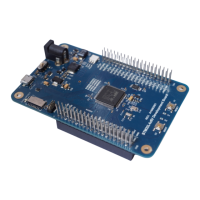SD/SDIO/MMC card host interface (SDMMC) RM0351
1396/1693 DocID024597 Rev 3
By default SDMMC_D0 is used for data transfer. After initialization, the host can change the
databus width.
If a MultiMediaCard is connected to the bus, SDMMC_D0, SDMMC_D[3:0] or
SDMMC_D[7:0] can be used for data transfer. MMC V3.31 or previous, supports only 1 bit of
data so only SDMMC_D0 can be used.
If an SD or SD I/O card is connected to the bus, data transfer can be configured by the host
to use SDMMC_D0 or SDMMC_D[3:0]. All data lines are operating in push-pull mode.
SDMMC_CMD has two operational modes:
• Open-drain for initialization (only for MMCV3.31 or previous)
• Push-pull for command transfer (SD/SD I/O card MMC4.2 use push-pull drivers also for
initialization)
SDMMC_CK is the clock to the card: one bit is transferred on both command and data lines
with each clock cycle.
The SDMMC uses two clock signals:
• SDMMC adapter clock SDMMCCLK = 50 MHz)
• APB2 bus clock (PCLK2)
PCLK2 and SDMMC_CK clock frequencies must respect the following condition:
The signals shown in Table 219 are used on the MultiMediaCard/SD/SD I/O card bus.
Table 219. SDMMC I/O definitions
Pin Direction Description
SDMMC_CK Output
MultiMediaCard/SD/SDIO card clock. This pin is the clock from
host to card.
SDMMC_CMD Bidirectional
MultiMediaCard/SD/SDIO card command. This pin is the
bidirectional command/response signal.
SDMMC_D[7:0] Bidirectional
MultiMediaCard/SD/SDIO card data. These pins are the
bidirectional databus.
Frequenc PCLK2()3xWidth()32⁄()Frequency SDMMC_CK()×>

